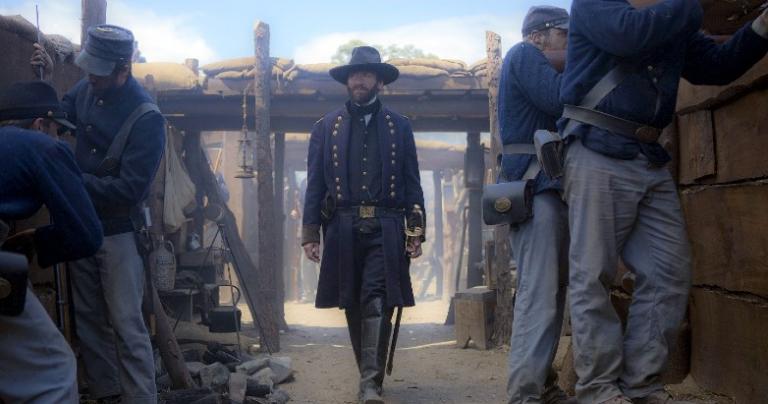
Almost 135 years after his death on July 23, 1885, brilliant general and troubled President Ulysses S. Grant finally gets his full due.
The Alternate History of the Civil War
There’s an old saying that history is written by the winners, but then there’s the Civil War.
With Gone With the Wind as its centerpiece, the idea of the chivalrous, aristocratic South defending its right to live the way it chooses against the uncouth, rapacious ruffians of the North — Scarlett O’Hara’s “dirty Yankees” — defending the “Lost Cause” and ultimately losing the “War of Northern Aggression,” has held sway over much of the popular imagination.
And then there’s History’s Grant.
Parts one and two of the docudrama aired on the cablenet on Monday and Tuesday, May 25 and 26, detailing Ulysses Grant’s hardscrabble childhood, troubles with alcohol, spotty military career and ultimate ascendancy to a successful command of the Union Army under President and Commander-in-Chief Abraham Lincoln.
On Wednesday at 9 p.m. ET/PT, part three airs, covering Grant’s election to the presidency after the disastrous reign of Andrew Johnson, Lincoln’s former vice president, the scandals (none of Grant’s own making) that followed, and ultimate undoing of the hopeful promise of Reconstruction.
Also, it recounts the eventual tarnishing of the rough-and-tumble Grant’s reputation, while some epic myth-making by the former Confederacy burnished the star of the South’s patrician Gen. Robert E. Lee.
A Pivotal Election in a Divided Nation
Grant also emphasizes upon what a knife’s edge history teetered during Lincoln’s 1864 re-election bid, in which the battered Republican president took on Democrat challenger (and failed Union military leader) George McClellan, who was ready to sue for peace with the South at any cost — including the continuation of slavery.
Second only to Lincoln, Grant was responsible for saving the Union and ultimately destroying the institution of chattel slavery (although its aftereffects persist, to varying degrees, to this day). It’s long past time for celebrating the cigar-smoking soldier, who rose from a working-class background in Ohio to the White House (although beating the Confederate Army proved an easier task in some ways than dealing with the Washington swamp).
Despite being played by British actor Justin Salinger, Grant’s family was quite American, and had been for generations.
In between dramatized scenes from Grant’s life — the battle sequences are grim and often graphic — Grant features interviews with scholars and others, who are refreshingly not the usual parade of academic talking heads.
Executive-produced by Leonardo DiCaprio, the docudrama’s experts include Grant biographer Ron Chernow, retired United States Army General and former CIA director David Petraeus, acclaimed author and journalist Ta-Nehisi Coates, and professor of English at West Point Elizabeth Samet.
The Cottage Where Grant’s Story Was Written — and Ended
Grant ends where Grant’s life did, at a small, cozy cabin on the side of Mount McGregor in Wilton, N.Y., just north of Saratoga Springs (which lent its name to one of the Revolutionary War’s most pivotal battles). Some scenes were also filmed there.
Over its history, the neighboring property to Grant Cottage has been a hotel, a tubercular sanitarium, a rest home for veterans, a school for developmentally disabled children, and until its closure in 2014, a minimum-security prison.
Back when I lived in Saratoga in the ’90s, I visited the cottage, which is kept the way it was when Grant died — right down to the stained coverlet on the bed and the original, large floral decorations (yep, still there, ever since 1885). Whenever COVID-19 recedes, and the world opens again, you can visit Grant Cottage (homepage here), currently maintained by dedicated volunteers.
It’s the place where a dying and near penniless Grant, accepting a publication offer from Samuel Clemens, a k a Mark Twain, wrote his memoirs. Now considered a literary classic, the two-volume work both ensured his legacy and was a financial success. You can read it for free here, via the Gutenberg Project, or order it from Amazon here.
It begins with,
“Man proposes and God disposes.” There are but few important events in the affairs of men brought about by their own choice.
It then ends thus:
The war has made us a nation of great power and intelligence. We have but little to do to preserve peace, happiness and prosperity at home, and the respect of other nations. Our experience ought to teach us the necessity of the first; our power secures the latter.
I feel that we are on the eve of a new era, when there is to be great harmony between the Federal and Confederate. I cannot stay to be a living witness to the correctness of this prophecy; but I feel it within me that it is to be so. The universally kind feeling expressed for me at a time when it was supposed that each day would prove my last, seemed to me the beginning of the answer to “Let us have peace.”
The expression of these kindly feelings were not restricted to a section of the country, nor to a division of the people. They came from individual citizens of all nationalities; from all denominations—the Protestant, the Catholic, and the Jew; and from the various societies of the land—scientific, educational, religious or otherwise. Politics did not enter into the matter at all.
I am not egotist enough to suppose all this significance should be given because I was the object of it. But the war between the States was a very bloody and a very costly war. One side or the other had to yield principles they deemed dearer than life before it could be brought to an end. I commanded the whole of the mighty host engaged on the victorious side. I was, no matter whether deservedly so or not, a representative of that side of the controversy. It is a significant and gratifying fact that Confederates should have joined heartily in this spontaneous move. I hope the good feeling inaugurated may continue to the end.
If you are a cable subscriber to History and have missed Grant so far, you can watch it online here (if you sign in through your cable provider) or via History On Demand.
Image: Photo by Casey Crawford, Copyright 2020, for History
Don’t miss a thing: Subscribe to all that I write at Authory.com/KateOHare














